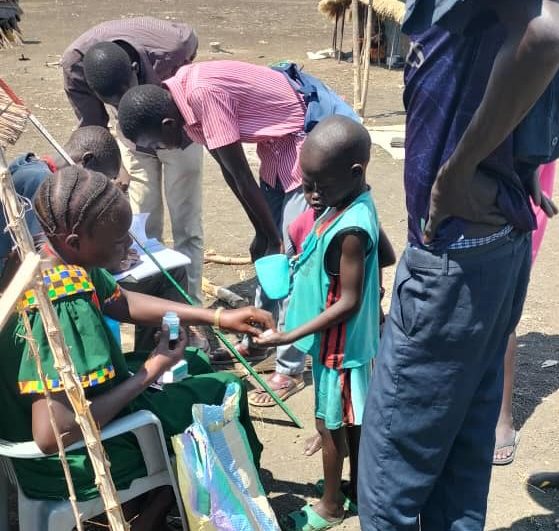A mass drug administration (MDA) campaign targeting onchocerciasis (also known as ‘river blindness’) and lymphatic filariasis began in South Sudan earlier this month. These two Neglected Tropical Diseases (NTDs) are among the five endemic NTDs that respond to Preventive Chemotherapy (PC-NTDs).
MENTOR and the NTD Department of the South Sudanese Ministry of Health are delivering the campaign, which aims to protect and treat thousands of people who are at risk from these two harmful diseases.
The campaign covers seven counties in South Sudan, some of which are endemic for onchocerciasis, lymphatic filariasis, or for both diseases. It is being implemented in areas bordering Ethiopia as part of a cross-border elimination programme, and is funded by The END Fund. In Maban County, the campaign will also reach many refugees in addition to the host population.
MENTOR and The END Fund began their partnership in South Sudan in 2017, carrying out MDA campaigns for lymphatic filariasis and onchocerciasis in Western Equatoria. In 2021, the partnership was renewed to deliver programmes in the states of Jonglei and Upper Nile where, in addition to carrying the burden of NTDs, thousands of people are also frequently affected and displaced by civil unrest and recurrent floods.
How it is delivered
The National NTD Coordination Team leads project implementation with oversight and technical assistance from MENTOR. A community-based distribution strategy, which includes door-to-door directly observed treatment, is used by community drug distributors, with supervision from trained County, Payam and Boma supervisors. In some cases, treatment is distributed at a centralised location within a community.
Prior to treatment an Information Education Communication (IEC) campaign raised awareness through radio messages, banners, posters, and flyers, to increase acceptance and promote disease prevention messaging.
The situation in South Sudan
South Sudan became the world’s youngest independent nation in 2011. After a period of building governance structures and increasing institutional capacity, tensions between different ethnic groups brought political instability leading to civil conflict and clashes in 2013. The conflict remains ongoing in parts of the country, with periods of confrontation alternated with periods of peace.
Despite political and security challenges, the Ministry of Health has worked diligently to scale-up NTD treatment where resources and security allow. In 2022, 100% geographical coverage was achieved for the first time in 64 counties where these two NTDs are endemic.
MENTOR, The END Fund and other partners continue to work towards the control and subsequent elimination of NTDs in South Sudan.

